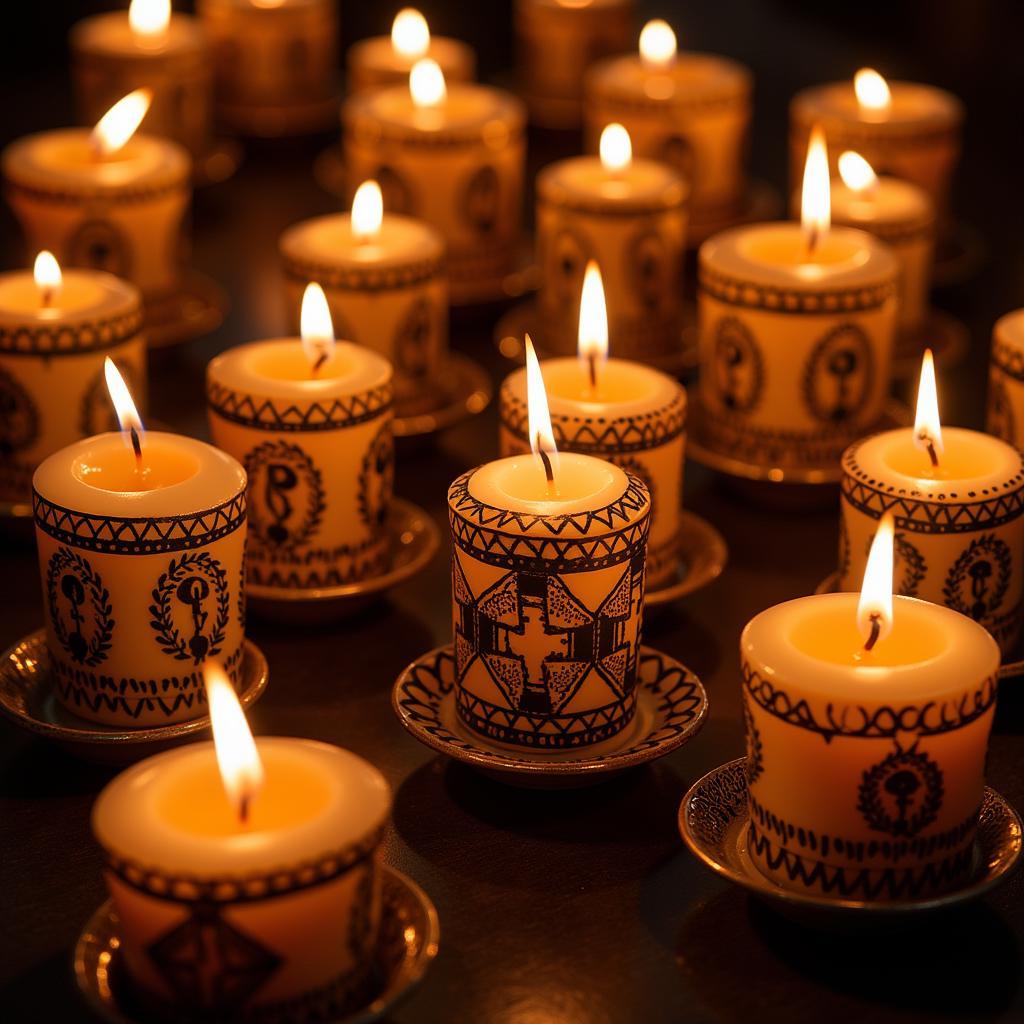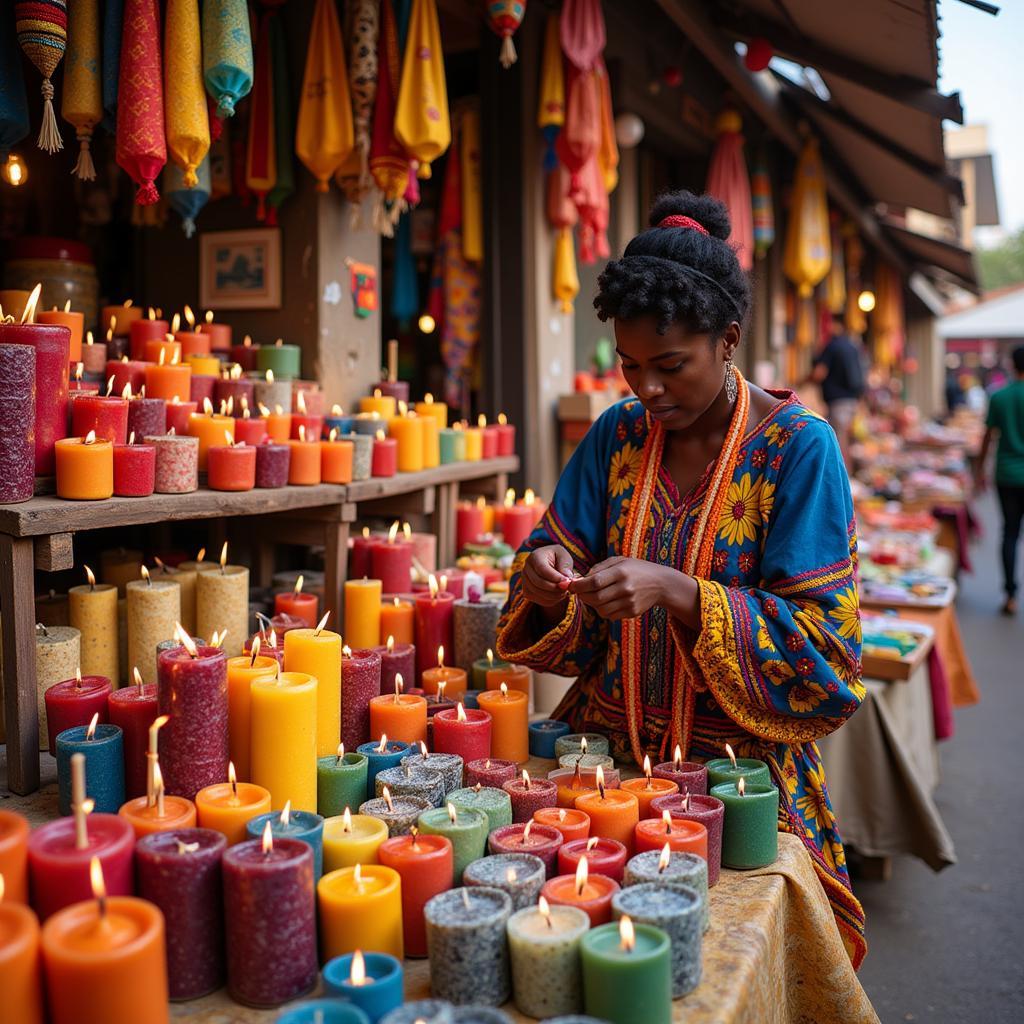The Warm Glow of Tradition: Exploring African Candles
African Candles, more than just a source of light, embody a rich tapestry of cultural significance and artistic expression. From the bustling markets of Marrakech to the serene villages of the Serengeti, these candles illuminate homes, ceremonies, and spiritual practices across the continent. Their flickering flames tell stories passed down through generations, weaving together history, spirituality, and everyday life in a captivating dance of light and shadow.
Beyond Illumination: The Cultural Significance of African Candles
For centuries, candles have played a vital role in African societies, transcending their practical use to become deeply intertwined with cultural identity. Their presence is felt in both sacred rituals and everyday moments, reflecting the deep respect for tradition and heritage that permeates African Life.
Spiritual Illumination: Candles in Ritual and Ceremony
Across the diverse spiritual landscape of Africa, candles hold a sacred place, acting as a bridge between the physical and spiritual realms. They are often used in traditional ceremonies, their flickering flames symbolizing prayers offered to ancestors and deities.
- Ancestral Veneration: In many African cultures, ancestors are believed to guide and protect their descendants. Candles serve as a way to honor these ancestors, providing light and warmth as families gather to share stories and seek their wisdom.
- Ritual Offerings: Candles often accompany offerings of food, drink, and other symbolic items presented to deities and spirits. Their flames are believed to carry these offerings to the spiritual realm.
- Cleansing and Protection: The act of lighting a candle can hold deep spiritual significance, symbolizing the dispelling of negativity and the invitation of positive energy.
A Celebration of Life’s Milestones
Beyond their spiritual significance, African candles also illuminate life’s most important moments, marking joyous celebrations and solemn occasions with their warm glow.
- Birth and Naming Ceremonies: The arrival of a new life is a momentous event in many African cultures, often celebrated with rituals that involve candles. The soft light of the candle symbolizes the fragility of new life and the hope for a bright future.
- Weddings: Candles often feature prominently in traditional African wedding ceremonies, symbolizing unity, love, and the joining of two families.
- Funerals: In many cultures, candles are lit in remembrance of loved ones who have passed away. They represent the enduring spirit of the departed and provide comfort to the bereaved.
 African Ceremonial Candles
African Ceremonial Candles
The Art of African Candle Making: From Humble Beginnings to Modern Masterpieces
The craft of candle making in Africa is as diverse as the continent itself, with techniques and styles passed down through generations. From simple hand-dipped tapers to elaborately carved sculptures, African candles are a testament to the creativity and artistry embedded in everyday objects.
Traditional Techniques: Honoring Ancient Craftsmanship
- Beeswax Candles: Beeswax, a natural and readily available resource in many parts of Africa, has been used for centuries to create candles. Known for their sweet, honeyed aroma and natural golden hue, beeswax candles are often favored for spiritual ceremonies.
- Hand-Dipped Candles: This traditional technique involves repeatedly dipping wicks into molten wax, building up layers until the desired thickness is achieved. Hand-dipped candles often have a charmingly rustic appearance.
- Carved Candles: Skilled artisans transform blocks of wax into intricate sculptures, using tools to carve out detailed designs and patterns. These carved candles are true works of art, often depicting animals, cultural symbols, or scenes from everyday life.
Modern Innovations: A Fusion of Tradition and Contemporary Design
Today, African candle makers continue to innovate, incorporating new materials, techniques, and design aesthetics while still honoring traditional craftsmanship.
- Soy and Palm Wax Candles: These plant-based waxes have gained popularity in recent years as sustainable alternatives to paraffin wax. They offer a clean burn and are often preferred for their environmentally friendly properties.
- Scented Candles: Infused with essential oils and natural fragrances, scented candles add an olfactory dimension to the ambiance. Popular scents often draw inspiration from African flora, such as baobab, shea butter, and hibiscus.
- Contemporary Designs: From minimalist geometric patterns to bold, abstract forms, contemporary African candle makers are pushing the boundaries of design, creating candles that are both stylish and culturally evocative.
 African Candle Market
African Candle Market
African Candles in the Home: Creating Warmth, Ambiance, and Cultural Connection
Incorporating African candles into your home is a beautiful way to infuse your living spaces with warmth, character, and a touch of African heritage.
Decorating with African Candles
- Centerpieces: Create a stunning focal point on your dining table or coffee table with a grouping of African candles in varying heights and designs.
- Accent Lighting: Use candles to highlight artwork, bookshelves, or architectural features, adding a soft, inviting glow to your space.
- Creating Ambiance: The gentle flicker of candlelight can instantly transform the mood of a room, creating a warm and inviting atmosphere for relaxation or entertaining.
Choosing the Right African Candles for Your Home
- Style: Consider your existing décor and choose candles that complement your personal style. Whether you prefer minimalist designs, bold colors, or traditional motifs, there’s an African candle to suit every taste.
- Scent: If you enjoy scented candles, opt for fragrances that evoke a sense of Africa, such as sandalwood, frankincense, or spices like cardamom and clove.
- Purpose: Think about how you want to use the candles. Are they primarily for decoration, ambiance, or special occasions?
FAQs: Illuminating the World of African Candles
1. Where can I buy authentic African candles?
Authentic African candles can be found in a variety of places, including online marketplaces, specialty stores specializing in African goods, and directly from artisans.
2. Are African candles environmentally friendly?
The environmental impact of African candles depends on the materials used. Beeswax, soy wax, and palm wax candles are considered more sustainable options compared to paraffin wax.
3. What is the significance of the colors used in African candles?
Colors often hold symbolic meaning in African cultures. For example, white may represent purity, red may symbolize strength or passion, and green may signify growth or prosperity.
4. Are African candles only used for religious purposes?
While candles play a significant role in many African spiritual practices, they are also used for a wide range of secular purposes, including home décor, ambiance, and special occasions.
5. Can I burn African candles safely in my home?
Yes, you can burn African candles safely in your home by following basic candle safety guidelines, such as never leaving a burning candle unattended and keeping them away from flammable materials.
Discover More About the Magic of African Culture
Intrigued by the rich history and cultural significance of African candles? Delve deeper into the fascinating world of African art, design, and tradition with these related articles:
- African House Decor: Explore creative ways to infuse your home with the vibrant spirit of Africa.
- African Gifts for Men: Find unique and meaningful gifts that celebrate African craftsmanship and heritage.
African candles, with their warm glow and deep-rooted cultural significance, offer a captivating glimpse into the heart of African traditions. From their use in sacred ceremonies to their presence in everyday life, these candles illuminate not only our homes but also the rich tapestry of African heritage.


